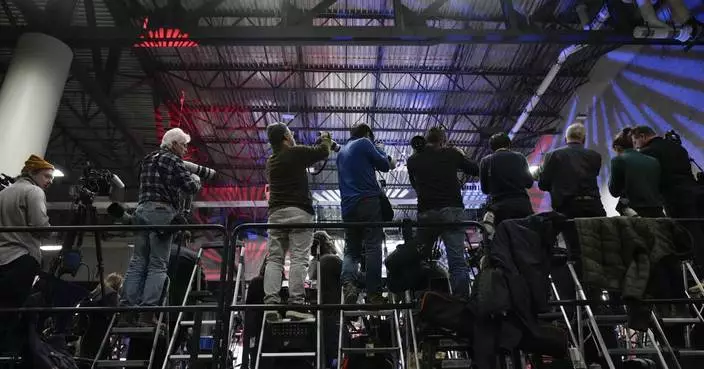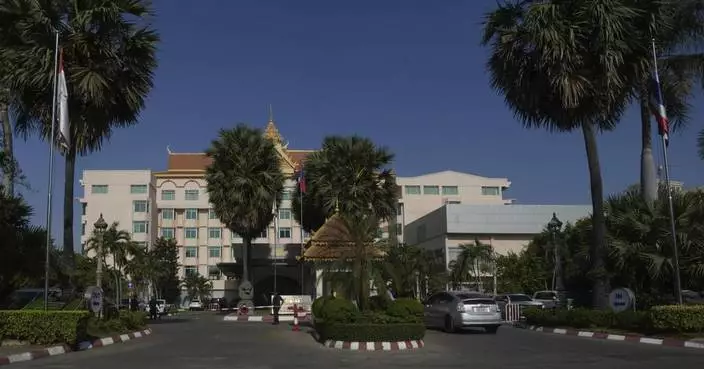Tens of thousands of dead fish have been found on the banks of a lake in a protected nature reserve in northern Greece after high temperatures and drought conditions caused a severe drop in water levels.
State environmental officials said Thursday that the water level at Lake Koroneia has dropped by more than 70% percent in the past three years, to 80 centimeters (31 inches), with the decline triggering the death of carp, sunfish, bleak and other freshwater fish.
Click to Gallery
Tens of thousands of dead fish have been found on the banks of a lake in a protected nature reserve in northern Greece after high temperatures and drought conditions caused a severe drop in water levels.
"Due to the high temperatures, the solubility of oxygen is limited in the body of water that is left," Bobori said. "We have sent samples of dead fish and water for toxicological testing, as high temperatures also give rise to toxicity levels."
The lake is part of the European Union's network of protected nature areas and Greek authorities have launched a long-term effort to try and prevent Koroneia from drying out, employing water diversions, temporary fishing bans, and a crackdown on the illegal disposal of industrial waste from nearby factories.
"The frequency of this phenomenon makes it statistically likely that this is in part driven by manmade climate change."
Dimitra Bobori, an associate biology professor at the University of Thessaloniki and the lake's senior administrator, said dissolved oxygen concentrations in the water had fallen below a critical level, accelerating the deaths over the last week.
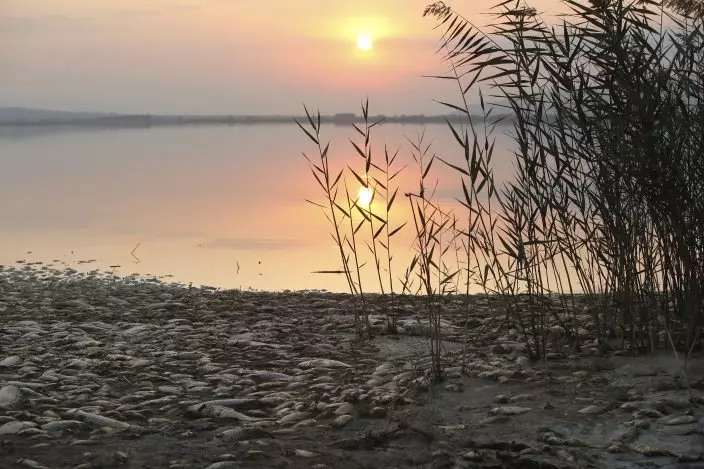
Dead fish lie on the shores of Koroneia Lake in northern Greece, on Thursday, Sept. 19, 2019. Tens of thousands of dead fish are washing up as the water level has plummeted to less than a meter deep (three feet) and the lack of oxygen in the water is leading to mass mortality of everything in it. (AP PhotoGiannis Papanikos)
"Due to the high temperatures, the solubility of oxygen is limited in the body of water that is left," Bobori said. "We have sent samples of dead fish and water for toxicological testing, as high temperatures also give rise to toxicity levels."
Once one of Greece's largest lakes, Koroneia is 30 kilometers (18.5 miles) east of Greece's second-largest city Thessaloniki.
Originally spanning 4,500 hectares (11,000 acres), it has shrunk to about a third of its original size over the past three decades.
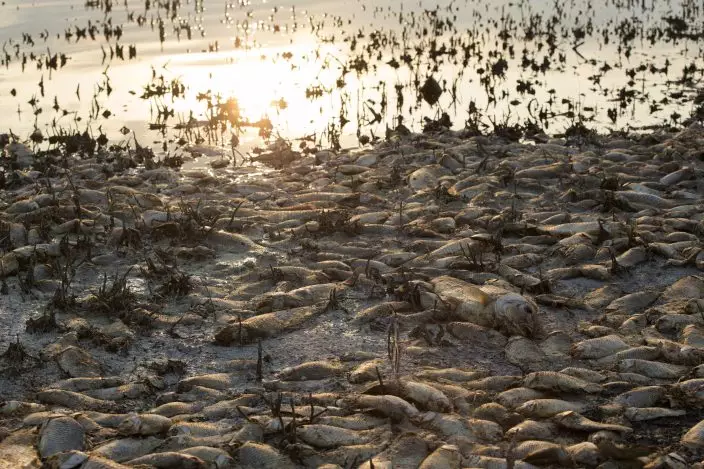
Dead fish lie on the shores of Koroneia Lake in northern Greece, on Thursday, Sept. 19, 2019. Thousands of freshwater fish have been found dead at Lake Koroneia, outside the northern Greek city of Thessaloiniki, after the water level fell sharply due to a drought in the region. (AP PhotoGiannis Papanikos)
The lake is part of the European Union's network of protected nature areas and Greek authorities have launched a long-term effort to try and prevent Koroneia from drying out, employing water diversions, temporary fishing bans, and a crackdown on the illegal disposal of industrial waste from nearby factories.
Water levels had stabilized at about three meters (10 feet) by 2015, but summers are getting longer and hotter.
"Over the last 20 years, there is no doubt that the weather has become hotter in this region, and the trend is worsening," Prodromos Zanis, a professor of meteorology and climate science at the University of Thessaloniki, told The Associated Press.
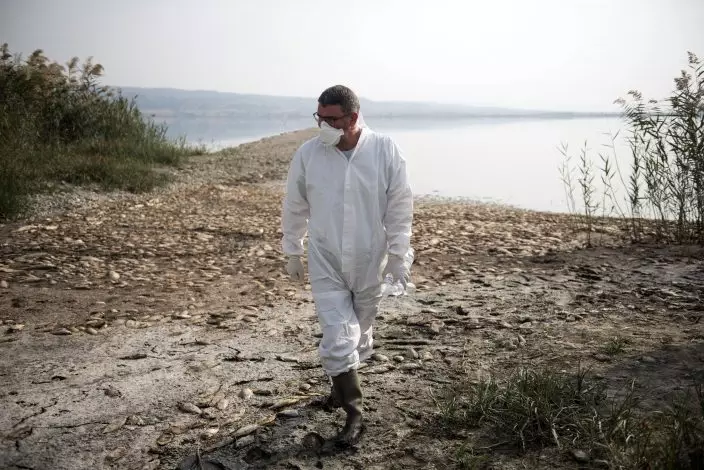
An expert inspects the shores of Koroneia Lake in northern Greece, on Thursday, Sept. 19, 2019. Thousands of freshwater fish have been found dead at Lake Koroneia, outside the northern Greek city of Thessaloiniki, after the water level fell sharply due to a drought in the region. (AP PhotoGiannis Papanikos)
"The frequency of this phenomenon makes it statistically likely that this is in part driven by manmade climate change."
Villages on the banks of Koroneia and nearby Lake Volvi have seen their livelihoods hit by the receding water.
"There are thousands of dead fish near us and the smell is awful," said store owner Nikolaos Rossias, from the lakeside village of Agios Vassilis. "There used to be 10 fish restaurants in the village."
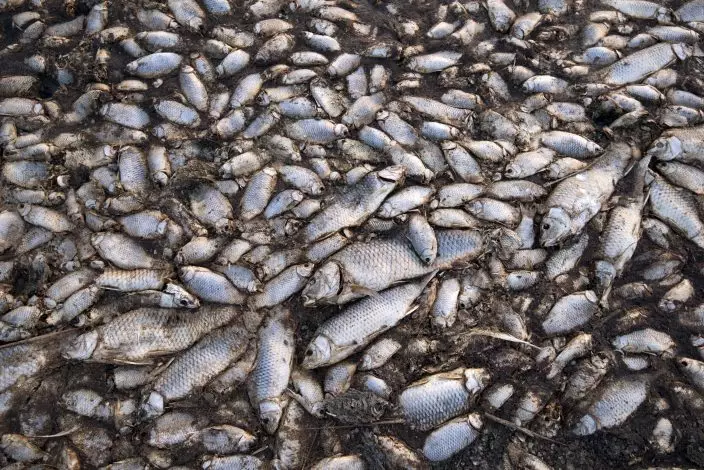
Dead fish lay on the shore of Koroneia Lake in northern Greece, on Thursday, Sept. 19, 2019. Tens of thousands of dead fish are washing up as the water level has plummeted to less than a meter deep (three feet) and the lack of oxygen in the water is leading to mass mortality of everything in it. (AP PhotoGiannis Papanikos)
Now there is only one.
"It feels like nobody cares about the lake ... so many fish have died and our wealth was destroyed."
Follow Kantouris at https://twitter.com/CostasKantouris
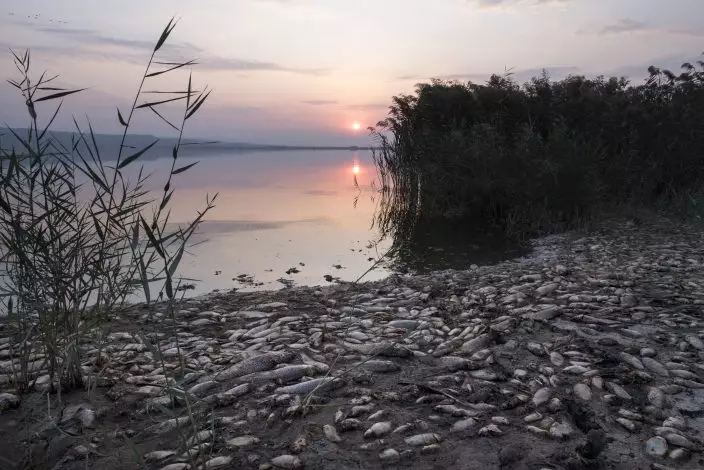
Dead fish lie on the shore of Koroneia Lake in northern Greece, on Thursday, Sept. 19, 2019. Tens of thousands of dead fish are washing up as the water level has plummeted to less than a meter deep (three feet) and the lack of oxygen in the water is leading to mass mortality of everything in it. (AP PhotoGiannis Papanikos)
BEIRUT (AP) — The European Union announced Thursday an aid package for Lebanon of 1 billion euros — about $1.06 billion — much of which will go to boost border control to halt the flow of asylum seekers and migrants from the small, crisis-wracked country across the Mediterranean Sea to Cyprus and Italy.
The deal follows other EU aid packages for countries such as Egypt, Tunisia and Mauritania to fortify their borders. It comes against a backdrop of increasing hostility toward Syrian refugees in Lebanon and a major surge in irregular migration of Syrian refugees from Lebanon to Cyprus.
European Union Commission President Ursula von der Leyen said during a Beirut visit with Cypriot President Nikos Christodoulides that the aid distribution will start this year and last till 2027.
The bulk of the aid — 736 million euros — would go to support Syrian refugees “and other vulnerable groups” in Lebanon, while 200 million euros are meant to bolster Lebanese security services in enforcing border and migration control, according to figures provided by the Cypriot government.
An unspecified amount would go to Lebanese fishermen, to discourage them from selling their boats to smugglers.
Von der Leyen said the EU will also work on a “more structured approach to voluntary return" of Syrian refugees "in close cooperation with” the U.N. refugee agency. The bloc will continue to maintain “legal pathways” for resettlement of refugees in Europe, she said.
Lebanon's caretaker Prime Minister Najib Mikati praised the package, saying that “Lebanon’s security is security for European countries and vice versa,” and that an escalation of the crisis ”will not be limited to Lebanon but will extend to Europe."
Lebanon, which has been in the throes of a severe financial crisis since 2019, hosts nearly 780,000 registered Syrian refugees and hundreds of thousands more who are unregistered, the world's highest refugee population per capita.
Lebanese political officials have for years urged the international community to resettle the refugees in other countries or assist their return to Syria — voluntarily or not. Lebanese security forces have stepped up deportations of Syrians over the past year.
Tensions further flared after an official with the Christian nationalist Lebanese Forces party, Pascal Suleiman, was killed last month in what military officials said was a botched carjacking by a Syrian gang. The incident prompted outbreaks of anti-Syrian violence by vigilante groups.
Meanwhile, Cypriot authorities complain the island nation has been overwhelmed by irregular migration of Syrian asylum seekers, many of them coming on boats from Lebanon.
The UNHCR in Lebanon said it had verified 59 “actual or attempted” departures by boats carrying a total of 3,191 passengers from Lebanon between January and mid-April, compared to three documented boat movements carrying 54 passengers in the same period last year. Usually, few boats attempt the much more dangerous crossing in the winter. In all of 2023, UNHCR recorded 65 boat departures carrying 3,927 passengers.
Cyprus has taken a new approach to halting the flow of migrants. Last month, it suspended processing of Syrian asylum applications, and human rights groups accused the Cypriot coast guard of forcibly turning back five boats carrying about 500 asylum seekers coming from Lebanon. Cypriot officials have denied this.
Bassel al-Shayoukh, a Syrian refugee from Idlib living in Lebanon since 2014, said his brother and several cousins and nephews were on one of the boats turned back. Now he wants to make the journey himself.
“In the beginning I thought that in a year or two the war would be over in Syria,” he said, but it dragged on, while in Lebanon “every year ... the situation began to get worse.”
Shayoukh said he fears being beaten by vigilantes or deported to Syria after Lebanese authorities declined to renew his residency permit.
His 17-year-old nephew, who declined to give his name fearing for his safety, said the Cypriot coast guard started making waves to push the boat he was on away. “I was terrified... I don’t know how to swim,” he said. “I thought we were going to die.”
The people on the boats “stayed three days without food or water” before turning back to Lebanon, the teen added.
Back in Lebanon, they were detained by the army; those registered with UNHCR were released and the others deported.
Mohammed Sablouh, a Lebanese human rights lawyer who works on refugee and migrant cases, says Lebanese authorities are deliberately “turning a blind eye" to the surge in migration to "pressure the international community.”
The Lebanese army did not respond to a request for comment on their measures to combat smuggling.
Thursday's aid announcement comes ahead of the annual fundraising conference for the Syrian crisis in Brussels later this month. After 13 years of civil war, donor fatigue has set in while the world’s attention is occupied by the humanitarian fallout of more recent conflicts in Ukraine and Gaza.
The Cypriot president said Thursday was a “historic day” and called for European officials to go farther and declare some areas of Syria safe for return.
“The current situation is not sustainable for Lebanon. It is not sustainable for Cyprus, it is not sustainable for the European Union,” Christodoulides said.
But not all Lebanese officials are convinced the European aid would solve the problem.
Lebanese Forces party head Samir Geagea told The Associated Press earlier this week that European authorities are mainly concerned “that the refugees don’t go to Europe."
"For us the problem is that we cannot have our country drowning in illegal Syrian refugees,” Geagea said, urging for Syrians to be sent back to either government or opposition-held areas of the neighboring country.
But Shayoukh says he has nowhere to go.
The Damascus government wants him for opposing Syrian President Bashar Assad, he said, while the Islamist group that now controls his hometown behaves "the same way as the regime’s intelligence services” in crushing dissidents.
Associated Press writer Menelaos Hadjicostis in Nicosia, Cyprus, contributed to this report.
Follow AP’s global migration coverage at: https://apnews.com/hub/migration

Lebanese caretaker Prime Minister Najib Mikati, center, speaks during his meeting with Cyprus' President Nikos Christodoulides, left, and President of the European Commission Ursula von der Leyen at the government palace in Beirut, Lebanon, Thursday, May 2, 2024. (AP Photo/Hassan Ammar)
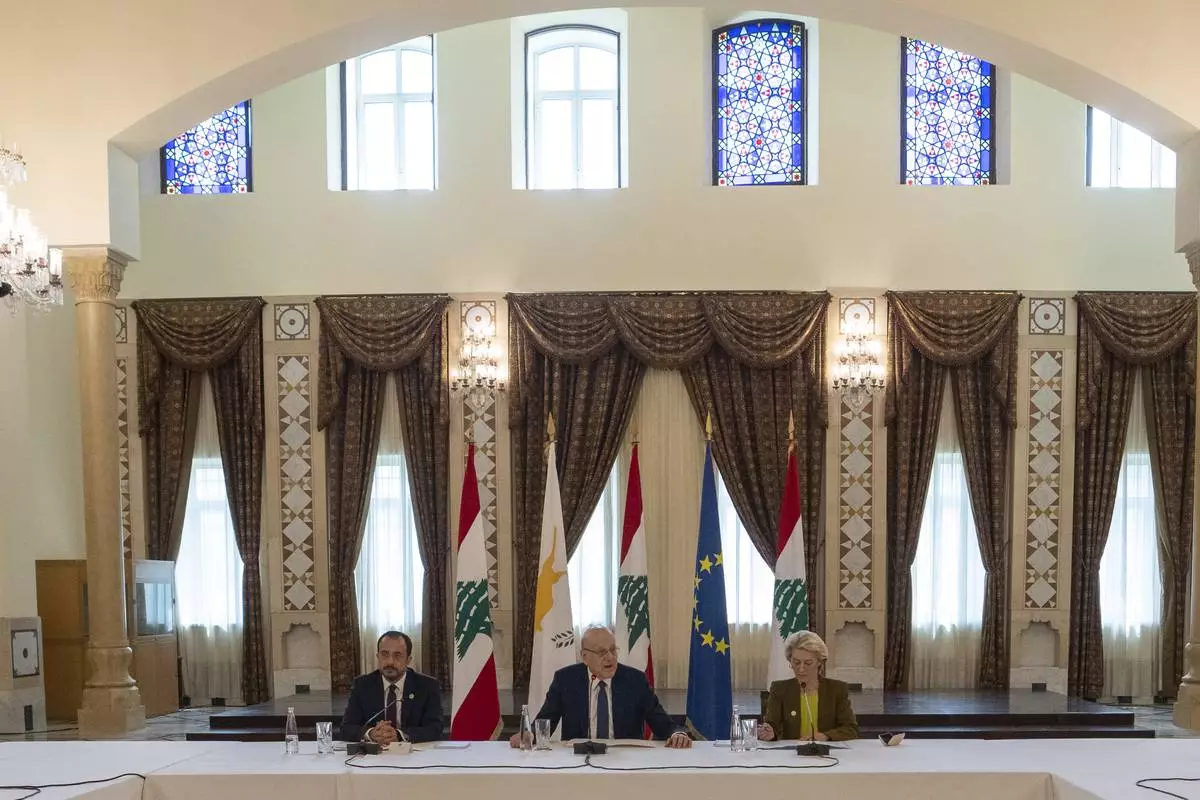
Lebanese caretaker Prime Minister Najib Mikati, center, speaks during his meeting with Cyprus' President Nikos Christodoulides, left, and President of the European Commission Ursula von der Leyen at the government palace in Beirut, Lebanon, Thursday, May 2, 2024. (AP Photo/Hassan Ammar)

Lebanese caretaker Prime Minister Najib Mikati, center, welcomes Cyprus' president Nikos Christodoulides, left, and President of the European Commission Ursula von der Leyen before their meeting at the government palace in Beirut, Lebanon, Thursday, May 2, 2024. (AP Photo/Hassan Ammar)

Lebanese caretaker Prime Minister Najib Mikati, center, Cyprus' President Nikos Christodoulides, left, and President of the European Commission Ursula von der Leyen pose for photograph at the government palace in Beirut, Lebanon, Thursday, May 2, 2024. (AP Photo/Hassan Ammar)

Lebanese caretaker Prime Minister Najib Mikati, right, welcomes Cyprus' president Nikos Christodoulides before their meeting at the government palace in Beirut, Lebanon, Thursday, May 2, 2024. (AP Photo/Hassan Ammar)

Cyprus' President Nikos Christodoulides, left, and President of the European Commission Ursula von der Leyen, center, review an honor guard upon their arrival to meet with the Lebanese Speaker Nabih Berri, in Beirut, Thursday, May 2, 2024. (AP Photo/Hussein Malla)

Lebanese caretaker Prime Minister Najib Mikati, center, speaks during his meeting with Cyprus' President Nikos Christodoulides, left, and President of the European Commission Ursula von der Leyen at the government palace in Beirut, Lebanon, Thursday, May 2, 2024. (AP Photo/Hassan Ammar)

Lebanese caretaker Prime Minister Najib Mikati, center, welcomes Cyprus' President Nikos Christodoulides, left, and President of the European Commission Ursula von der Leyen at the government palace in Beirut, Lebanon, Thursday, May 2, 2024. (AP Photo/Hassan Ammar)
















